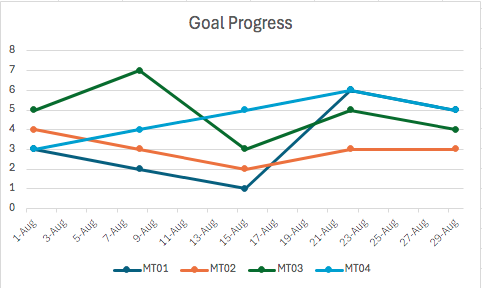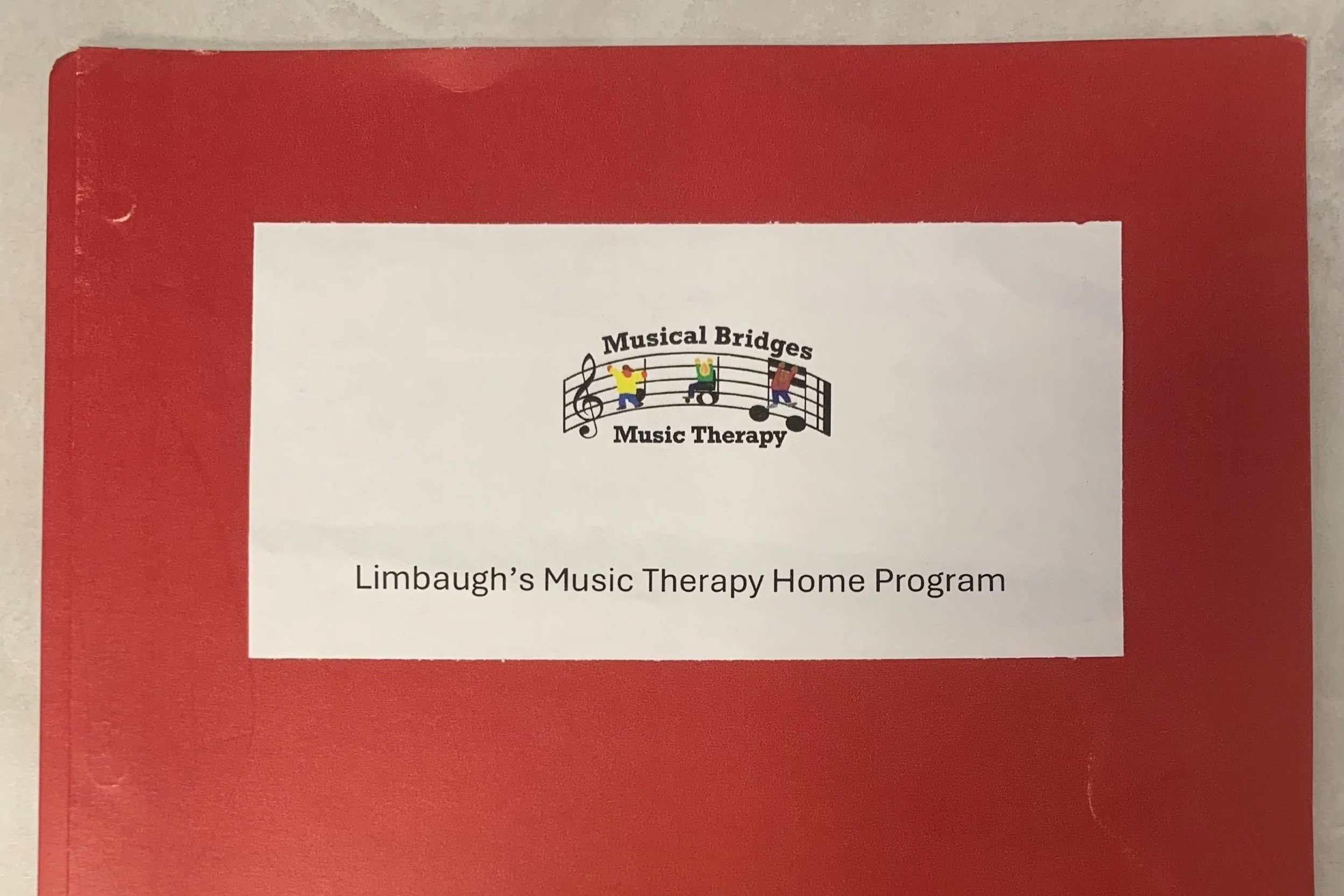What Makes Musical Bridges Different?
MUSIC THERAPY VS. THERAPEUTIC MUSIC
One of the responses that a music therapist will frequently get when they are asked their profession is, “Oh, I do my own music therapy on my own! I make my own playlists and listen to them when I need a break.” This is a great self care and coping strategy, and we never want to discourage it. It is also, however, a very common misconception about what music therapy actually is. The names are similar, but music therapy and therapeutic music are distinct and different: therapeutic music is passive music listening to promote the general wellbeing of an individual, but music therapy is a service provided by a board-certified professional to meet non-musical goals.
At Musical Bridges, our clients receive high-quality music therapy from board certified professionals. A music therapy certification is achieved only after the completion of a Bachelor’s degree in music therapy, an internship of 1,000 hours, and passing the exam. While a therapeutic musical experience like a curated playlist may be helpful, it is not a comparable experience to that of a music therapy session.
All employees of Musical Bridges have not only completed the full educational and certification processes to become board-certified music therapists, but they have also devoted themselves to further education and have received additional training to become Neurologic Music Therapists®. This distinction is achieved through an entirely separate training, and is categorized as an advanced music therapy practice by the American Music Therapy Association.
A NEUROLOGIC MUSIC THERAPY® CLINIC
It’s on our marketing materials, website, and name badges, but what exactly does it mean to be a Neurologic Music Therapy® clinic and be Neurologic Music Therapists®? Neurologic Music Therapy® is an advanced music therapy practice that requires hours of training and continuing education, just like the initial music therapist training. It is firmly rooted in neuroscience, the study of the brain, and is ever-growing and evolving. It currently is characterized by 20 Neurologic Music Therapy® techniques that all work to focus on different pieces of function and cognition of the human body. You may have seen some of these on our blog posts, and will continue to see them as we break down exactly how each technique is utilized and tailored to each client.
By having a staff that are all trained as Neurologic Music Therapists®, there are a plethora of benefits. All therapists at Musical Bridges come from different universities with different approaches to being a music therapist, which is wonderful for having multiple mindsets and ideas when approaching treatment. All therapists being NMTs™ creates a common ground that we are all able to bounce ideas off of; we have the same framework and same ideologies, with occasionally different approaches. We are also able to substitute for each other easily, as we all work from those same 20 NMT™ techniques.
STANDARDIZATION
Neurologic Music Therapy® is at the forefront of neuroscience in the world today, and is recognized by multiple institutions outside of the American Music Therapy Association as a viable and important practice. Each client is given musical assessments that are reassessed each year. Alongside music assessments, Musical Bridges utilizes standardized nonmusical assessments for each goal area that are reassessed when appropriate, some as often as quarterly.
These reassessments serve multiple purposes. First and foremost, they let the therapists know exactly how music therapy treatment is affecting and aiding clients. Second, they use the same language that our clients will be receiving from their other practitioners. With this common language, all of our clients have hard data that can be easily aligned with their other therapies to best support them.
Standardization is incredibly important for the profession. Music therapy is an evidence-based practice, meaning we heavily rely on new research in both our field and in the medical field as a whole. By having standardized, evidence-based assessments and reassessments, we are doing our part to continue providing the most effective treatment that we can.
DATA INTEGRATION
Alongside standardized assessments, when clients receive their yearly reports, they will be complete with visuals of all client data. Each session that is documented is inputted into a chart and a graph that conceptualizes those numbers in a way that is easy to read and easy to note progress. Many therapies that our clients see utilize similar data charts, and when they are put side by side, we are able to see a rounded picture of how our clients are growing within all of their treatment plans.
These graphs are presented both will all goals, and singularly with each goal. They are fully explained to note any abnormalities that may have occurred during the treatment time period, and what techniques were presented to help the client meet their goals.
An example of what a data chart from a Musical Bridges reassessment might look like. The date is charted on the X axis and the number of successful trials by the client is charted on the Y axis.
HOME PROGRAM
At Musical Bridges, we believe in extending the benefits of music therapy beyond our sessions through structured home practice. Each client receives personalized weekly homework that reinforces their therapeutic goals and progress.
This home program creates a bridge between therapy sessions, allowing skills to generalize into daily life while keeping families engaged in the therapeutic process. It's designed to be manageable, taking just a few minutes each day, while maximizing the impact of music therapy services.
SPECIALIZED CLINIC
Musical Bridges works with any and all individuals, though we do specialize in working with children and young adults with disabilities. There are several reasons for this, that are further broken down in our blog post “Why We Specialize.” These range from being able to focus on tailoring our continuing education to the majority of clients we see, to strengthening our community bonds.
Music Therapists are required to maintain their certifications by completing continuing education courses, and Neurologic Music Therapists® are required the same. By tailoring our continuing education courses to working with children and teens with disabilities, we are able to provide services that are of the highest caliber and the most up-to-date with current research.
Musical Bridges maintains a strong, healthy relationship with a number of community partners that work toward providing support to our area children with disabilities. We regularly spend weekends at fairs, walks, and other events that these organizations plan. We do this so that our community is united in its goal to get children access to invaluable resources. We believe that music therapy is one of these resources, and we work hard to maintain these relationships.
COLLABORATIVE CLINICAL OVERSIGHT
When you work with us, you get the benefit of a whole team’s expertise. Every one of our Neurologic Music Therapists® is guided by a lead therapist as well as a supervisor with over two decades of experience. We prioritize consistency of care through weekly supervision and regular session observations. This allows us to maintain the high standards our clinic is known for, giving you peace of mind that your loved one is always in experienced, supported hands.
A THERAPEUTIC FAMILY
All clients and partners of Musical Bridges are cherished by the staff. We celebrate our clients’ accomplishments and work hard to provide as much support as we can to see them grow and flourish. When you become a client at Musical Bridges, you become a part of our Musical Bridges family. We love to see everyone’s achievements both in and out of sessions, and we do our very best to contribute to those accomplishments and celebrate when they occur.
If you would like to be a part of our Musical Bridges Family, we would love to serve you!



